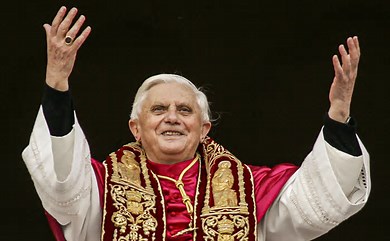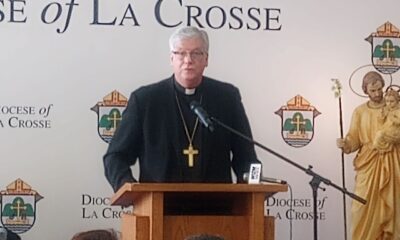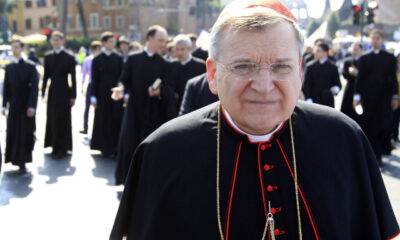Faith
Retired Pope Benedict dies at age 95

VATICAN CITY (AP) — He was the reluctant pope, a shy bookworm who preferred solitary walks in the Alps and Mozart piano concertos to the public glare and majesty of Vatican pageantry. When Cardinal Joseph Ratzinger became Pope Benedict XVI and was thrust into the footsteps of his beloved and charismatic predecessor, he said he felt a guillotine had come down on him.
So it should have come as little surprise that with a few words uttered in Latin on a Vatican holiday in 2013, Benedict ended it all, announcing that he would become the first pope in 600 years to resign.
His dramatic exit paved the way for Pope Francis’ election and created the unprecedented arrangement of two popes, living side-by-side in the Vatican gardens. And it likely won’t be a one-off, given that Francis has said Benedict “opened the door” for other popes to follow suit.
Francis praised Benedict in comments on Saturday during a service held at St. Peter’s Basilica.
“Only God knows the value and the strength of his intercession, of his sacrifices offered for the good of the Church,” Francis said.
The Vatican announced that Benedict died Saturday at his home in the Vatican at age 95. Francis himself will celebrate Benedict’s funeral Mass on Thursday, to which only Italy and Germany were asked to send official delegations, closing out an unprecedented chapter in the history of the papacy with a reigning pope eulogizing a retired one.
The intellectual German theologian, whose mission was to reawaken Christianity in a secularized and indifferent Europe, was forced to shoulder the brunt of the sex abuse scandal that festered unattended under St. John Paul II. Then, as he planned to make a quiet exit from the papacy, another scandal erupted when his own butler stole his personal papers and gave them to a journalist — leading to revelations that laid bare the need for a reformer pope to clean up the Vatican’s act.
In between crises, Benedict pursued his single-minded vision to rekindle faith in a world that he frequently lamented seemed to think it could do without God.
“In vast areas of the world today, there is a strange forgetfulness of God,” he told 1 million young people gathered on a vast field for his first foreign trip as pope, World Youth Day in Cologne, Germany, in 2005. “It seems as if everything would be just the same even without Him.”
With some decisive, often controversial moves, he tried to remind Europe of its Christian heritage. And he set the Catholic Church on a conservative, tradition-minded path that often alienated progressives. He relaxed restrictions on celebrating the old Latin Mass and launched a crackdown on American nuns, insisting that the church stay true to its doctrine and traditions in the face of a changing world.
It was a path that in many ways was reversed by his successor, Francis, whose mercy-over-morals priorities alienated the traditionalists who had been so indulged by Benedict.
Those conservatives spent much of Francis’ reform-minded papacy — and Benedict’s waning years in retirement — nostalgic for the good old days of the German pope, when doctrine and law seemed paramount and the church’s moral teachings clear. They were never more outraged than when Francis reversed Benedict’s edict to allow greater celebration of the old Latin Mass.
Benedict’s style couldn’t have been more different from that of John Paul or Francis. No globe-trotting media darling or populist, Benedict was a teacher and theologian to the core: quiet and pensive with a fierce mind. He spoke in paragraphs, not soundbites. He had a weakness for orange Fanta, cats as well as his beloved library; when he was elected pope, he had his entire study moved — as is — from his apartment just outside the Vatican walls into the Apostolic Palace. The books followed him to his retirement home.
“In them are all my advisers,” he said in the 2010 book-length interview, “Light of the World.” “I know every nook and cranny, and everything has its history.”
Like his predecessor, Benedict made reaching out to Jews a hallmark of his papacy. His first official act as pope was a letter to Rome’s Jewish community and he became the second pope in history, after John Paul, to enter a synagogue.
In his 2011 book, “Jesus of Nazareth,” Benedict made a sweeping exoneration of the Jewish people for the death of Christ, explaining biblically and theologically why there was no basis in Scripture for the argument that the Jewish people as a whole were responsible for Jesus’ death.
“It’s very clear Benedict is a true friend of the Jewish people,” said Rabbi David Rosen, who heads the interreligious relations office for the American Jewish Committee, at the time of Benedict’s retirement.
Yet Benedict also offended some Jews who were incensed at his constant defense of and promotion toward sainthood of Pope Pius XII, the World War II-era pope accused by some of having failed to sufficiently denounce the Holocaust. And they harshly criticized Benedict when he removed the excommunication of a traditionalist British bishop who had denied the Holocaust.
Benedict’s relations with the Muslim world were also a mixed bag. He riled Muslims with a speech in September 2006 — five years after the Sept. 11 attacks in the United States — in which he quoted a Byzantine emperor who characterized some of the teachings of the Prophet Muhammad as “evil and inhuman,” particularly his command to spread the faith “by the sword.”
A subsequent comment after the massacre of Christians in Egypt led the Al Azhar center in Cairo, the seat of Sunni Muslim learning, to suspend ties with the Vatican that were only restored under Pope Francis.
The decision to leave may have been Benedict’s personal choice, but it’s likely to have a long-term impact on the papal job description going forward.
“For the century to come, I think that none of Benedict’s successors will feel morally obliged to remain until their death,” said Paris Cardinal Andre Vingt-Trois on the day the resignation was announced.
Benedict was often misunderstood. Nicknamed “God’s Rottweiler” by the unsympathetic media, he was actually a sweet and fiercely smart academic who devoted his life to serving the church he loved.
“Thank you for having given us the luminous example of the simple and humble worker in the vineyard of the Lord,” Benedict’s longtime deputy, Cardinal Tarcisio Bertone, told him in one of his final public events as pope.
Ratzinger inherited the seemingly impossible task of following in the footsteps of John Paul when he was elected the 265th leader of the Church on April 19, 2005. He was the oldest pope elected in 275 years and the first German in nearly 1,000 years.
As John Paul’s right-hand man, he had been a favorite going into the vote and was selected in the fastest conclave in a century: Just about 24 hours after the voting began, white smoke curled from the Sistine Chapel chimney at 5:50 p.m. to announce “Habemus Papam!”
Benedict wrote three encyclicals, “God is Love” in 2006, “Saved by Hope” in 2007 and “Charity in Truth” in 2009. The last was perhaps his best known as it called for a new world financial order guided by ethics that was published in the throes of the global financial meltdown.
He penned a fourth, “The Light of Faith,” that was eventually published in July 2013 under a joint byline with his successor, Francis, who finished it off after Benedict retired.
Benedict’s call for financial ethics was more than just an exhortation: He amended the Vatican city state’s legal code to comply with international norms to fight money laundering and terror financing, putting the Vatican on the path to financial transparency in a bid to shed its image as a scandal-marred tax haven.
Born April 16, 1927, in Marktl Am Inn, in Bavaria, Benedict wrote in his memoirs of being enlisted in the Nazi youth movement against his will in 1941, when he was 14 and membership was compulsory. He deserted the German army in April 1945, the waning days of the war.
Benedict was ordained, along with his brother, Georg, in 1951. After spending several years teaching theology in Germany, he was appointed bishop of Munich in 1977 and elevated to cardinal three months later by Pope Paul VI.
If there were any doubts about Benedict’s priority to reinvigorate Christianity in Europe, his choice of a papal name was as good an indication as any.
Benedict told cardinals soon after he was elected that he hoped to be a pope of peace, like Pope Benedict XV, who reigned during World War I. But the first Benedict — St. Benedict of Norcia — was also an inspiration.
The 5th- and 6th-century monk is a patron saint of Europe and inspired the creation of the Benedictine order, the main guardian of learning and literature in Western Europe during the dark centuries that followed the fall of the Roman Empire.
Until his 2020 death, his brother Georg was a frequent visitor, even after Benedict retired. His sister died years earlier. His “papal family” consisted of Monsignor Georg Gaenswein, his longtime private secretary who was always by his side, another secretary and consecrated women who tended to the papal apartment.
They were with him when he received the sacrament of the anointing of the sick on Wednesday, three days before he died.
___
Follow AP’s coverage of the death of Pope Emeritus Benedict XVI at https://apnews.com/hub/pope-benedict-xvi







